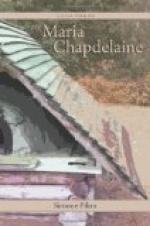“That is so, some men are made that way. Samuel, for example, and you, and many another. It seem as if the woods had some magic for you ...” She shook her head and looked at him in wonderment. “Frozen in winter, devoured by flies in summer; living. in a tent on the snow, or in a log cabin full of chinks that the wind blows through, you like that better than spending your life on a good farm, near shops and houses. Just think of it; a nice bit of level land without a stump or a hollow, a good warm house all papered inside, fat cattle pasturing or in the stable; for people well stocked with implements and who keep their health, could there be anything better or happier?”
Paradis, looked at the floor without making answer, perhaps a trifle ashamed of these wrong-headed tastes of his. “A fine life for those who are fond of the land,” he said at last, “but I should never have been content.”
It was the everlasting conflict between the types: pioneer and farmer, the peasant from France who brought to new lands his ideals of ordered life and contented immobility, and that other in whom the vast wilderness awakened distant atavistic instincts for wandering and adventure.
Accustomed for fifteen years to hear her mother vaunting the idyllic happiness of the farmer in the older settlements, Maria had very naturally come to believe that she was of the same mind; now she was no longer certain about it. But whoever was right she well knew that not one of the well-to-do young fellows at St. Prime, with his Sunday coat of fine cloth and his fur collar, was the equal of Paradis in muddy boots and faded woollen jersey.
Replying to further questions he spoke of his journeys on the North Shore and to the head-waters of the rivers—of it all very naturally and with a shade of hesitation, scarcely knowing what to tell and what to leave out, for the people he was speaking to lived in much the same kind of country and their manner of life was little different.
“Up there the winters are harder yet than here, and still longer. We have only dogs to draw our sleds, fine strong dogs, but bad-tempered and often half wild, and we feed them but once a day, in the evening, on frozen fish.... Yes, there are settlements, but almost no farming; the men live by trapping and fishing ... No, I never had any difficulty with the Indians; I always got on very well with them. I know nearly all those on the Mistassini and this river, for they used to come to our place before my father died. You see he often went trapping in winter when he was not in the shanties, and one season when he was at the head of the Riviere aux Foins, quite alone, a tree that he was cutting. for firewood slipped in falling, and it was the Indians who found him by chance next day, crushed and half-frozen though the weather was mild. He was in their game preserve, and they might very well have pretended not to see him and have left him to die there; but they put him




